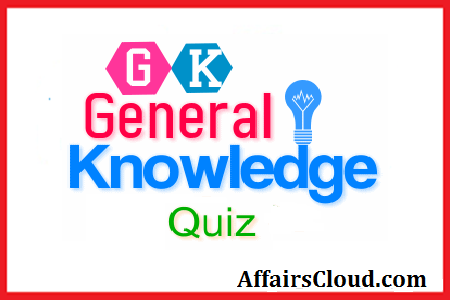Hello Aspirants.
Welcome to Online General Knowledge section in Affairs cloud, which is important for all the competitive exams. We have created Some questions related to General Science(Physics) !!
- The Ideal gas equation is
1.PV = nRT
2.PV = R/T
3.PV = RT
4.PT = VR
5.None of theseAnswer – 1.PV = nRT
Explanation :
The ideal gas equation is PV=nRT - The specific heat of water is
1.1
2.1.5
3.2
4.0.5
5.None of theseAnswer – 1.1
Explanation :
The specific heat of water is 1 calorie/gram °C = 4.186 joule/gram °C which is higher than any other common substance. - According to Kelvin-Planck statement, which of the following is true ?
1.Conversion of work into heat
2.Conversion of heat into energy
3.Conversion of energy into work
4.Conversion of heat into work
5.None of theseAnswer – 4.Conversion of heat into work
Explanation :
The Kelvin–Planck statement of the second law of thermodynamics states that it is impossible to devise a cyclically operating device, the sole effect of which is to absorb energy in the form of heat from a single thermal reservoir and to deliver an equivalent amount of work - Heat transfer from a colder body to a hotter body, where both have finite thermal capacity.This is according to
1.Kelvin statement
2.Ohm Statement
3.Clausius statement
4.Coloumb Statement
5.None of theseAnswer – 3.Clausius statement
Explanation :
Clausius statement to rule out heat transfer from a colder body to a hotter body, where both have finite thermal capacity. - Cavitation is the formation of vapour cavities in a
1.Acid
2.Gas
3.Soild
4.Liquid
5.None of theseAnswer – 4.Liquid
Explanation :
Cavitation is the formation of vapour cavities in a liquid – i.e. small liquid-free zonesthat are the consequence of forces acting upon the liquid. - Reynolds number is related to
1.Pressure
2.Velocity
3.Viscosity
4.Density
5.None of theseAnswer – 2.Velocity
Explantion :
The Reynolds number is an experimental number used in fluid flow to predict the flow velocity at which turbulence will occur - Which of the following is true ?
1.It depends upon atmosphere
2.Hot air is less dense than cool air
3.Hot air balloon not rises
4.Hot air is more dense than cool air
5.None of theseAnswer – 2.Hot air is less dense than cool air
Explanation :
The hot air balloon rises because hot air is less dense than cool air; the heated air causes the balloon to rise simply because it is lighter than an equal volume of cold air. - The ground state binding energy of positronium is half of that of
1.Hydrogen
2.Oxygen
3.Nitrogen
4.Helium
5.None of theseAnswer – 1.Hydrogen
Explanation :
Positronium (Ps) is a system consisting of an electron and its anti-particle.The ground state binding energy of positronium is half of that of Hydrogen. - One Dyne is equal to
1.10−4N
2.10−5N
3.10−2N
4.10−1N
5.None of theseAnswer – 2. 10−5 N
Explanation :
One dyne is equal to 10−5 N or to 10 nsn (nanosthenes) in the old metre–tonne–second system of units. - ……………. is the ratio of the flow inertia to the external field
1.Reynold Number
2.Boltzmann Constant
3.Avogadro Number
4.Froude Number
5.None of theseAnswer – 4.Froude Number
Explanation :
Froude number (Fr) is a dimensionless number defined as the ratio of the flow inertia to the external field
AffairsCloud Recommends Oliveboard Mock Test
AffairsCloud Ebook - Support Us to Grow
Govt Jobs by Category
Bank Jobs Notification



